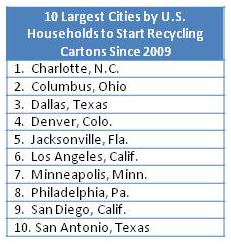 More than 47.9 million U.S. households can now recycle cartons thanks to efforts led by the Carton Council (www.recyclecartons.com), a group of carton manufacturers committed to reducing the environmental impact of cartons. This is an increase of 128% in just three years.
More than 47.9 million U.S. households can now recycle cartons thanks to efforts led by the Carton Council (www.recyclecartons.com), a group of carton manufacturers committed to reducing the environmental impact of cartons. This is an increase of 128% in just three years.
In 2009, carton recycling access in the U.S. stood at 18%, with 21 million households being able to recycle shelf-stable and refrigerated cartons. Now, 47.9 million U.S. households are able to recycle cartons through their community’s recycling programs, including programs in Dallas, Philadelphia, Milwaukee, Denver, San Diego and Los Angeles.
“Due to the collaboration of numerous stakeholders along the carton supply chain and lifecycle coupled with the enthusiastic support of local facilities and communities, we have achieved this impressive 40% milestone at a very quick pace,” says Jason Pelz, vice president, environment, Tetra Pak North America, and vice president of recycling projects for Carton Council of North America. “It is with this strong and growing support that we will continue to make progress in growing carton recycling access.”
Cartons are a fast-growing packaging solution — one that is taking up more and more space on grocery store shelves and subsequently in the waste stream. Fortunately, they are also a high-value material and are recyclable, thanks to their high-quality, virgin, long fiber. Recycling facility managers and community program officials are finding that it is no longer optional to include cartons as an accepted item in their recycling programs.
These stakeholders have seen firsthand the benefits that recycling cartons brings to their community. There is a long and growing list of “carton communities,” all of whom have found that once cartons have been added in to the recycling stream, they can generate a high yield with end markets. The “Faces of 40” — those who made the 40% access milestone possible — are as diverse as the communities they serve. They range from small and rural communities to the largest metropolitan areas on both coasts. They represent recycling programs in cities like Milwaukee, WI, material recovery facilities (MRFs) like Firstar Fiber, which services the City of Omaha, NE, and recycling companies such as ReCommunity.
“Adding cartons to our program not only provided another recycling opportunity for our residents, it also has contributed to a higher overall satisfaction from residents in our recycling service,” says Rick Meyers, resource recovery program manager for the City of Milwaukee. “We were able to take advantage of the great resources the Carton Council has developed to promote carton recycling and support them in their efforts to develop a stable infrastructure to help in the recovery and recyclability of cartons.”
“We know from experience that residents respond more favorably to recycling when they are given opportunities to include more materials,” says Dale Gubbels, CEO of Firstar Fiber, the MRF that handles residential recycling collection for the City of Omaha. “With the Carton Council’s assistance, we were able to secure guaranteed market outlets for cartons, which in turn helped us convince the City of Omaha to allow the inclusion of cartons in the recycling program.”
In a recent survey of carton recycling communities and facilities, more than 63% reported their primary reason for adding cartons to their recycling stream was to divert more materials from the waste stream and increase tonnage for the program/facility. And after adding cartons to their own programs or facilities, 93.8% said they would recommend carton recycling to another community.
“We know firsthand the economic, social and environmental power in recycling cartons and wholeheartedly support the Carton Council’s efforts to grow carton recycling access across the country landfill,” says Jeff Fielkow, executive vice president of revenue and growth with ReCommunity, a leading recycling and recovery company focused on dramatically reducing the volume of landfilled waste. “The Carton Council has proven to be a crucial and impactful partner in expanding access to recovering the valuable materials contained in cartons.”
While the 40% access milestone is being celebrated in communities across the country, the Carton Council has its eyes set on even bigger numbers, with the goal being to have carton recycling as widely accessible as possible.
“Our efforts in the U.S. will not stop at 40% access. Now, we see 50% on the horizon and are aiming much higher.” says Pelz. “We want cartons to be as common in curbside bins as they are on store shelves.”

